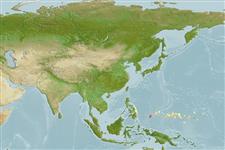>
Ovalentaria/misc (Various families in series Ovalentaria) >
Pomacentridae (Damselfishes) > Pomacentrinae
Etymology: Pomacentrus: Greek, poma, -atos = cover, operculum + Greek, kentron = sting (Ref. 45335); albiaxillaris: Named for its diagnostic white color of the pectoral-fin axil; compound adjective..
Environment: milieu / climate zone / depth range / distribution range
Ecología
marino asociado a arrecife; rango de profundidad 4 - 15 m (Ref. 114927), usually 4 - 15 m (Ref. 114927). Tropical
Distribución
Países | Áreas FAO | Ecosistemas | Ocurrencias, apariciones | Point map | Introducciones | Faunafri
Western Pacific: apparently restricted to Palau.
Tamaño / Peso / Age
Maturity: Lm ? range ? - ? cm
Max length : 7.0 cm SL macho / no sexado; (Ref. 114927)
Short description
Morfología | Morfometría
Espinas dorsales (total): 13; Radios blandos dorsales (total): 12-15; Espinas anales 2; Radios blandos anales: 13 - 15; Vértebra: 26. This species is distinguished by the following characters: D XIII,12-15 (usually 14); A II,13-15 (usually 14); pectoral-fin rays 16-18 (usually 18); tubed lateral-line scales 15-18 (rarely 15-16); total gill rakers on first arch 22-25 (usually 23-24); body depth 2.0-2.2 in SL; no scales on preorbital, a single row of scales on suborbital, often restricted to posterior part, continuing around posterior margin of eye; colour in life generally gray to bluish gray with thick black or dark-brown scale margins creating a network pattern; a small black spot restricted to the uppermost portion of pectoral-fin base; both sides of pectoral-fin axil white; dorsal and anal fins are dark gray or blackish with translucent portion posteriorly; caudal fin whitish; dorsal scleral surface of eye is bright blue. This species differs from from other members of the philippinus complex by having a small black spot restricted to the uppermost part of the pectoral-fin base vs. a large black spot that completely covers the base, and by having a white pectoral-fin axil vs. other colors or not especially colored (Ref. 114927).
Life cycle and mating behavior
Madurez | Reproducción | Puesta | Huevos | Fecundidad | Larva
Allen, G.R., M.V. Erdmann and P.D. Pertiwi, 2017. Descriptions of four new species of damselfishes (Pomacentridae) in the Pomacentrus philippinus complex from the tropical western Pacific Ocean. J. Ocean Sci. Found. 25:47-76. (Ref. 114927)
IUCN Red List Status (Ref. 130435)
Threat to humans
Harmless
Human uses
Más información
PaísesÁreas FAOEcosistemasOcurrencias, aparicionesIntroduccionesStocksEcologíaDietacomponentes alimenticiosconsumo de alimentoRación
Nombres comunesSinónimosMetabolismoDespredadoresEcotoxicologíaReproducciónMadurezPuestaAgregación para la puestaFecundidadHuevosEgg development
Age/SizeCrecimientoLength-weightLength-lengthLength-frequenciesMorfometríaMorfologíaLarvaDinámica larvariaReclutamientoAbundanciaBRUVS
ReferenciasAcuiculturaPerfil de acuiculturaRazasGenéticaElectrophoresesheritabilidadEnfermedadesProcesamientoNutrientsMass conversion
ColaboradoresImágenesStamps, Coins Misc.SonidosCiguateraVelocidadTipo de nataciónSuperficie branquialOtolitosCerebrosVisión
Herramientas
Special reports
Download XML
Fuentes de Internet
Estimates based on models
Phylogenetic diversity index (Ref.
82804): PD
50 = 0.5000 [Uniqueness, from 0.5 = low to 2.0 = high].
Bayesian length-weight: a=0.02399 (0.01139 - 0.05051), b=2.98 (2.81 - 3.15), in cm total length, based on LWR estimates for this Genus-body shape (Ref.
93245).
Nivel trófico (Ref.
69278): 2.7 ±0.3 se; based on size and trophs of closest relatives
Resiliencia (Ref.
120179): Alto, población duplicada en un tiempo mínimo inferior a 15 meses (Preliminary K or Fecundity.).
Fishing Vulnerability (Ref.
59153): Low vulnerability (10 of 100).
